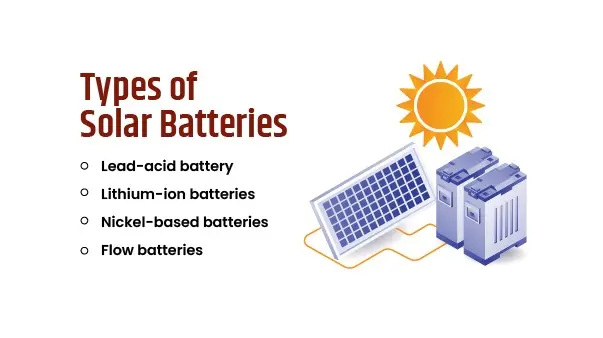What Are the Different Types of Solar Batteries
Knowing the type of solar batteries is an important factor if you are deciding to go solar or install solar panels. The selection of these batteries is important as they will be efficient and effective in the long run. Solar batteries are absolutely apt to be the perfect replacement for non-renewable sources. The connection of a solar battery to your solar panels can help you become more energy-independent. You won't need to depend on the local grid anymore. It will lead to less carbon emissions and reduce electricity costs considerably.
When looking for solar batteries for your home, two things are required- the type of solar battery you are looking for and the function of the battery that you need. KLK Ventures is dedicated to providing you with the best solar panels for home. With its efficiency, safety, and reliability, it helps you reach your energy goals while selecting the best type of solar battery.
In the present blog, we elaborate on the most common types of solar batteries used. Looking through them, you will be guided to make the best transitional energy decision for your home.
What is a Solar Battery?
A solar battery is an extremely useful component, a vital part of the whole structure. It acts as a storehouse for all the excess energy produced. This extra energy can be used at times of unfavourable weather conditions that hamper solar power generation, that is, nighttime or cloudy days.
The solar battery helps you use the excess solar energy you’re creating. If you don't have battery storage, the excess electricity that solar power generates goes to the grid. This means that this electricity is helpful for other people and you are not using it for yourself abundantly. To avail of the benefits of solar panels properly, you need to install solar batteries.
Types of Solar Batteries

The four main, popular, and commonly used types of solar batteries are as follows:
- Lead-acid battery
- Lithium-ion batteries
- Nickel-based batteries
- Flow batteries
These different types of batteries have unique functions, features, and their own advantages and disadvantages. They have unique characteristics that make them the priority when selecting the battery backup options. Now let us look at each of them in a detailed manner and what they have to offer.
Lead Acid Battery
A lead acid battery is composed of an electrolyte solution of sulphuric acid combined with lead plates. This chemical solution undergoes a reaction with these plates to ensure a continuous electric current flow. These types of battery systems are deep-cycle batteries, present in practice since the 1800s. Even now, such batteries are widely used because of the superior reliability they offer. They are mainly of two types.
Flooded Lead Acid battery- These are the type of rechargeable battery containing a liquid electrolytic solution of sulfuric acid.
Sealed Lead Acid battery- Also known as SLA batteries, they are completely closed with no requirement to check and clean the battery terminals.
Advantages:
- Lead acid batteries are the first choice of customers for their affordability. They have been in wide use for decades and are especially popular when required in small businesses.
- The gel-type solar battery is safe to use. It does not contain liquid electrolytes and, therefore, prevents any type of leakage.
- Lead acid batteries are efficient for their recyclability because they can be reused many times. It is because they contain recycled lead.
- Lead acid batteries are also reliable, considering their superb performance since they came into being in the 1800s. Their reliability is the reason why they are so popular in different applications of solar power technologies.
Disadvantages:
- Lead acid batteries don’t last for a longer period. They have a time span of two to five years.
- Although solar gel-type batteries require less maintenance, flooded lead-acid batteries need more maintenance. They need to be checked, and the battery terminals should also be cleaned frequently.
- Lead acid batteries have slow charging compared to other solar power systems.
Lithium-ion Batteries
Lithium-ion batteries are the new popularised form of batteries. They came into existence with the more usage of electric vehicles and are said to be the best type of batteries. A lithium-ion solar battery is made of lithium-ion cells connected in series or parallel. This increases the voltage or capacity.
Advantages:
- The lithium-ion solar battery has a high density. It stores a great amount of energy and is the first choice for use in portable electronic systems.
- When compared to lead-acid batteries, lithium-ion batteries have a longer time span. They can be charged and discharged easily for many years without getting damaged.
- Solar Lithium batteries operate at different levels of temperatures. They will rarely degrade in performance.
- These batteries can be charged quickly. Therefore, they are more effective even in the time of low sunlight.
Disadvantages:
- Lithium-ion batteries can sometimes be extremely dangerous to interact with. They require proper attention to the details pertaining to maintenance and storage.
- They are prone to risk in the conditions of extreme temperatures. If the weather is too hot or if it is too cold, their performance can be depleted.
Nickel Cadmium Battery
Nickel oxide hydroxide and cadmium are the key elements of the nickel-cadmium battery. This category of battery isn't very common and known to the masses, in contrast to lithium or lead ones. However, they can be a game changer due to their ability to store large amounts of energy. One such application of theirs is found in the aircraft industry.
Advantages:
- Nickel-cadmium batteries can operate at different levels of temperature. They are suitable for both hot and cold environments.
- They have a longer life and can be recharged or discharged many times before getting degraded.
- Nickel-cadmium batteries don’t require complex battery management systems.
Disadvantages:
- Nickel Cadmium batteries are highly toxic. They are harmful to human life and the environment if not disposed of properly.
- Energy density is very low.
- They require high maintenance.
Flow Batteries
Flow batteries, also known as redox flow batteries, are an emerging technology. They contain a liquid electrolytic solution that flows between the two separate tanks. They are best for large-scale installations.
Advantages:
- Flow batteries have a longer lifespan. The liquid electrolytes can be displaced without affecting the life of a battery as a whole.
- They have high efficiency, transferring a large amount of stored energy to useful electricity.
- Flow batteries are considered safer than other batteries because they contain non-toxic chemicals.
Disadvantages:
- Flow batteries are expensive compared to the other battery types because of their complex installations and processes.
- Flow batteries also have a low power density.
Having thus elaborated on various solar battery types, you will surely be able to select the best solar panel setup for your house. KLK Ventures has years of experience providing the best solar battery types to its customers. We have a team of experienced professionals to guide you for the optimum and guaranteed performance of solar batteries. You can contact our team to help you select the best product and guide you toward becoming solar.
